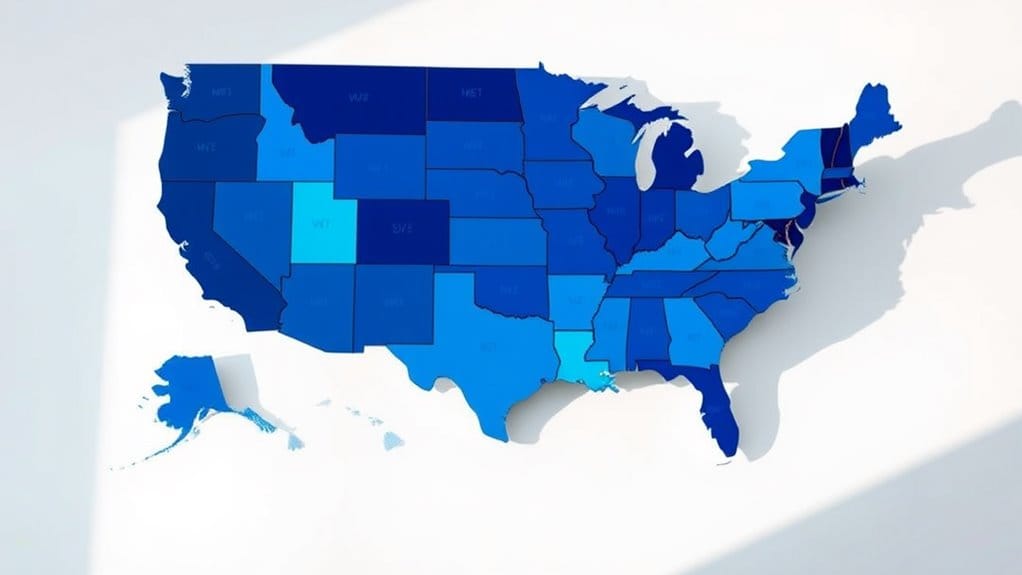Need SR-22 insurance assistance?
 CALL our licensed Agents
(Mon-Fri, 8am – 5pm PST) for personalized guidance CALL our licensed Agents
(Mon-Fri, 8am – 5pm PST) for personalized guidance |
When maneuvering out-of-state car insurance, you need to know several key points. Your coverage typically extends across all states, but it's crucial to understand each state's minimum requirements, which can vary greatly. If you're moving or traveling for an extended period, you must register your vehicle within 30 days. Students studying away should consider possible discounts but may need local insurance if they're residents. Ignoring local laws can lead to penalties, so be aware of compliance. Understanding these factors helps protect you against legal issues and financial losses, and there's more to explore on this topic.
Coverage While Traveling
When you're traveling across state lines, it's essential to understand how your car insurance provides coverage. Your policy generally covers you in all U.S. states, whether you're on an interstate road trip, vacation, or commuting for work. While minimum insurance requirements vary, your policy adjusts to meet the higher limits of the state where an accident occurs, thanks to the "broadening clause." This clause guarantees that you have adequate coverage, including liability, property damage, and medical expenses. In no-fault states, your Personal Injury Protection (PIP) extends even if it's not part of your original policy. Additionally, it's important to note that insurance coverage extends to accidents in any state, regardless of local requirements. Understanding these nuances helps you navigate potential accidents confidently while driving in different states. If you have prior violations, you may need to consider SR-22 insurance to maintain compliance with state regulations.
Registration and Residency Requirements
Understanding the registration and residency requirements is vital for anyone moving to New York with a vehicle from another state.
As a new resident, you must register your vehicle within 30 days of establishing residency. This involves completing the Vehicle Registration/Title Application (MV-82) and providing original proof of ownership, identity, and New York State automobile liability insurance.
You'll need two original Insurance ID Cards and must guarantee the insurance is in your name. Payment for sales tax and registration fees, ranging from $25 to $60, is also required. Additionally, ensure that your insurance meets the minimum liability coverage as required by your new state to avoid any compliance issues.
Failing to register can lead to fines and potentially suspending your registration or driver license, so it's important to comply promptly to avoid legal issues.
State Minimum Coverage Differences
While steering through the complexities of car insurance, it's crucial to recognize that state minimum coverage requirements vary considerably across the United States.
For instance, Alabama mandates $25,000 per person and $50,000 per accident for bodily injury liability, while California only requires $15,000 per person and $30,000 per accident.
In contrast, Florida has no bodily injury requirement but enforces a $10,000 property damage liability and PIP.
Property damage liability also differs; New York demands $50,000 per accident, whereas New Jersey requires just $5,000.
Coverage for uninsured motorists is often optional, as seen in New Hampshire and Virginia.
These differences highlight the importance of understanding local laws to guarantee compliance and adequate protection when driving in various states. Additionally, drivers should be aware of the DUI/DWI penalties that may vary by state, as these can influence insurance rates and coverage options.
Special Considerations for Students
Maneuvering car insurance can be particularly challenging for students attending college out of state, especially when considering the unique requirements and potential savings available.
If you're going to school more than 100 miles from home and don't bring your car, you might qualify for a "student away at school" discount.
If you live in the new state year-round, however, you'll likely need to purchase local insurance.
Updating your existing policy is essential if you own a car and your home is more than 100 miles away.
Make sure to compare quotes from various companies, as state regulations and local claim rates can affect premiums.
Always check your eligibility for discounts like good student or defensive driving course reductions.
Conclusion
Steering through out-of-state car insurance can feel like a complex puzzle, where each piece—coverage requirements, registration laws, and state minimums—plays a vital role. While you might enjoy the freedom of the open road, the nuances of insurance can tether you to regulations that vary widely. For students, the balance between home and school creates unique challenges. Ultimately, understanding these factors not only protects you legally but also enhances your driving experience, ensuring that adventure doesn't come with unexpected pitfalls.




